Exploring Peak Foliage
in the Pacific
Introduction
The Pacific region of the United States, encompassing California, Oregon, Washington, Alaska, and Hawaii, is a diverse and unique destination for fall foliage enthusiasts. From the rugged landscapes of Alaska to the coastal beauty of California, each state offers a distinct charm during the autumn season. In this article, we’ll delve into what makes Pacific fall foliage distinctive, explore the foliage characteristics of each state, and provide recommendations for places to experience the peak of autumnal splendor.
What Makes the Pacific Unique for Autumn Foliage?
The Pacific region stands out for its diverse range of ecosystems, from the towering redwoods of California to the glaciated peaks of Alaska. While traditional foliage states showcase vibrant colors, the Pacific offers unique features such as cooler temperatures in Hawaii and the opportunity to witness the changing leaves against stunning coastal backdrops. This region invites leaf peepers to explore less conventional foliage destinations with fewer crowds and an array of outdoor activities.
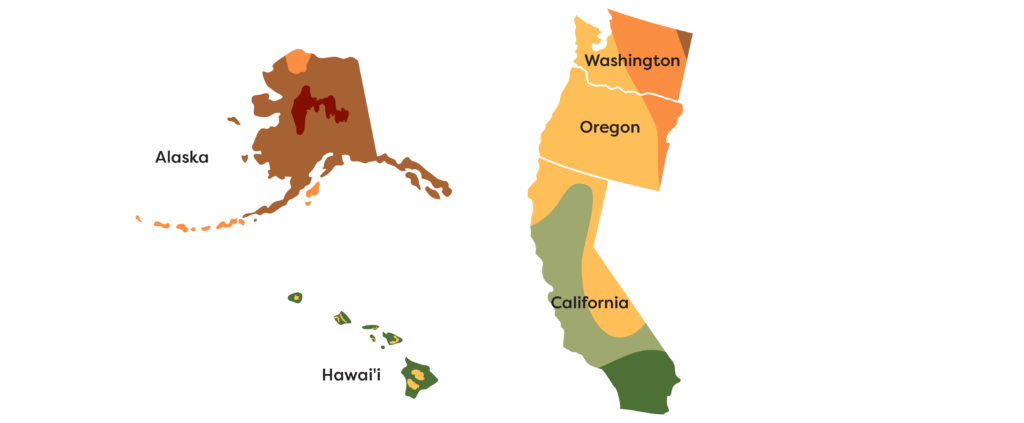
-
Late September
-
Early October
-
Mid October
-
Late October
-
Early-Mid November
-
Mid-Late November
Peak Foliage Timing
- High Elevation: early September to Mid-November
- Sea Level: Late September to late November
Foliage Characteristics
With the inclusion of Alaska and Hawaii, the Pacific emerges as arguably the most diverse region in the US, showcasing an extraordinary range of ecological wonders. Alaska’s vast tundra comes alive with a stunning display of fiery reds during the fall season, creating a stark and dramatic contrast against its rugged terrain. Meanwhile, Hawaii, nestled in the Pacific’s warm embrace, offers a subtropical twist for fall enthusiasts. The coexistence of these extreme climates within the same region contributes to the Pacific’s status as a mosaic of natural diversity. Beyond the extremes, the Pacific region boasts traditional foliage experiences in iconic states like California, Washington, and Oregon. These states not only provide the gorgeous forests, coastlines, rivers, valleys and vistas to witness the fall transformation, but they also offer cities and towns that are rich with culture, history, and activities to enjoy while taking in the autumn scenery.
Now that we have an understanding of the uniqueness of Pacific foliage, let’s take a look at what each state has to offer:
California
Foliage Characteristics
Because of California’s size and varied landscapes, it’s nearly impossible to summarize its foliage characteristics in one paragraph, but we’ll give it a go. Most notably, California is home to a diverse range of trees, including iconic species like the towering coast redwood, giant sequoia, and Joshua tree. These magnificent trees dominate the landscape in their respective regions, but California’s foliage goes far beyond these well-known species.
In the northern part of the state, the thick forests of the Pacific Northwest give way to a mix of coniferous and deciduous trees, including Douglas fir, Western hemlock, and California black oak. As you travel south, the climate becomes drier and more Mediterranean in nature, with a mix of evergreen and drought-resistant trees such as California live oak, manzanita, and toyon.
In the Sierra Nevada mountain range, forests of pine, fir, and cedar cover the slopes, interspersed with vibrant aspen groves in the higher elevations. In the foothills and valleys of the Central Valley and surrounding regions, you’ll find a blend of oak woodlands and riparian trees such as willow and cottonwood. Along the coast, a mix of chaparral and coastal scrub gives way to more evergreen species such as Monterey cypress, Monterey pine, and California bay laurel. And in the desert regions of southern California, you’ll find hardy plants like the iconic Joshua tree, as well as desert willows and mesquite trees.
Overall, California’s foliage is a reflection of its diverse geography and climate, with a mix of lush forests, dry deserts, and everything in between. As you explore the state, keep an eye out for its many unique and beautiful tree species–they’re one of the key components that make California such a special place.
Places to Explore
Take a scenic drive along the Avenue of the Giants to marvel at towering redwoods, or explore the Napa Valley for a unique blend of fall foliage and vineyard landscapes.
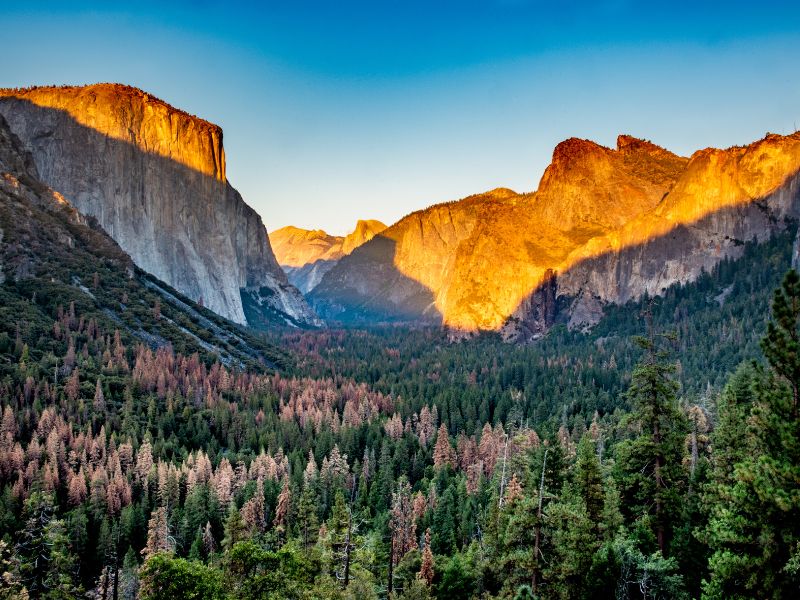
Oregon
Foliage Characteristics
Oregon’s landscapes are adorned with a mix of deciduous and evergreen trees. The deciduous trees provide the stunning fall colors that attract many visitors to the state. Some of the most iconic deciduous trees found in Oregon include bigleaf maple, Oregon ash, and red alder. Evergreen trees, such as Douglas fir, western hemlock, and redwood, remain green year-round and provide a beautiful contrast to the changing colors of the deciduous trees. This mix of foliage gives Oregon a vibrant and diverse appearance throughout the year.
Places to Explore
Visit Crater Lake National Park for stunning views of the lake surrounded by fall foliage, or explore the Columbia River Gorge for vibrant colors against a backdrop of waterfalls.
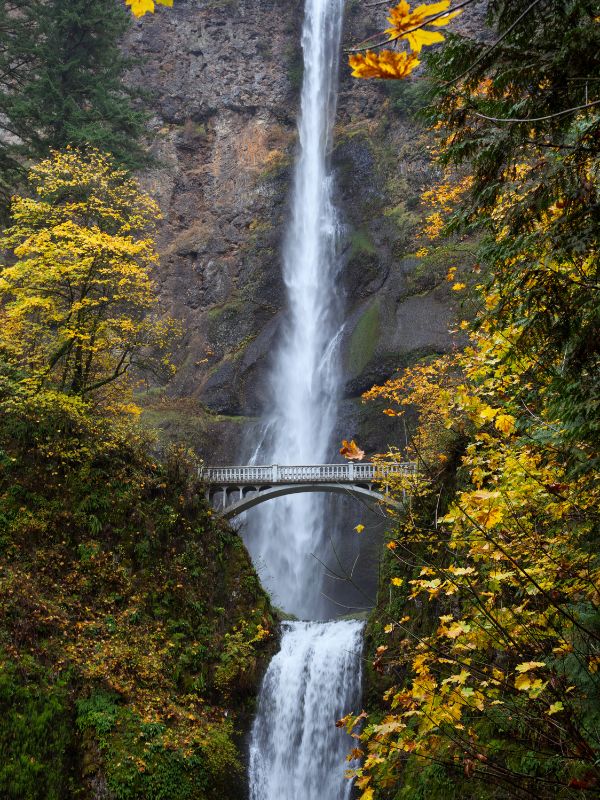
Washington
Foliage Characteristics
Places to Explore
Hike through Mount Rainier National Park for breathtaking mountain views amid fall colors, or tour the wineries in Walla Walla to enjoy wine tasting surrounded by autumn landscapes.
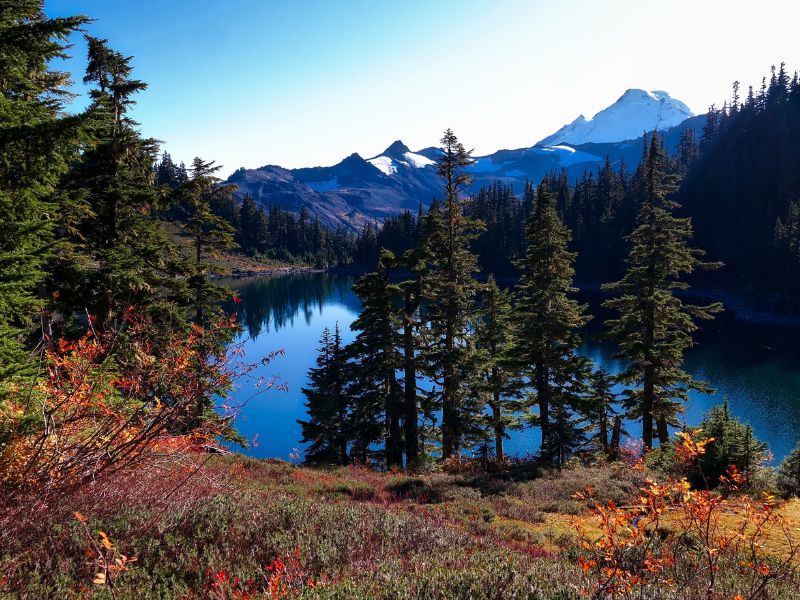
Alaska
Foliage Characteristics
The distinctive fall foliage of Alaska unfolds as a breathtaking spectacle, showcasing tundra plants adorned in vibrant hues of red and gold. The vast wilderness of the state serves as a canvas for nature’s autumnal artistry, providing a stunning backdrop that enhances the visual impact of the seasonal transformation. As you contemplate embarking on a foliage journey in Alaska, strategic planning becomes essential. High-elevation areas, where the vibrant colors reach their peak in September, demand careful consideration of the timing of your visit. This proactive approach ensures that you capture the full splendor of Alaska’s unique fall foliage, creating an unforgettable experience amid the pristine beauty of the Last Frontier.
Places to Explore
Explore Denali National Park for tundra landscapes ablaze with fall hues, or take a scenic drive along the Glenn Highway for a mix of mountain views and colorful foliage.
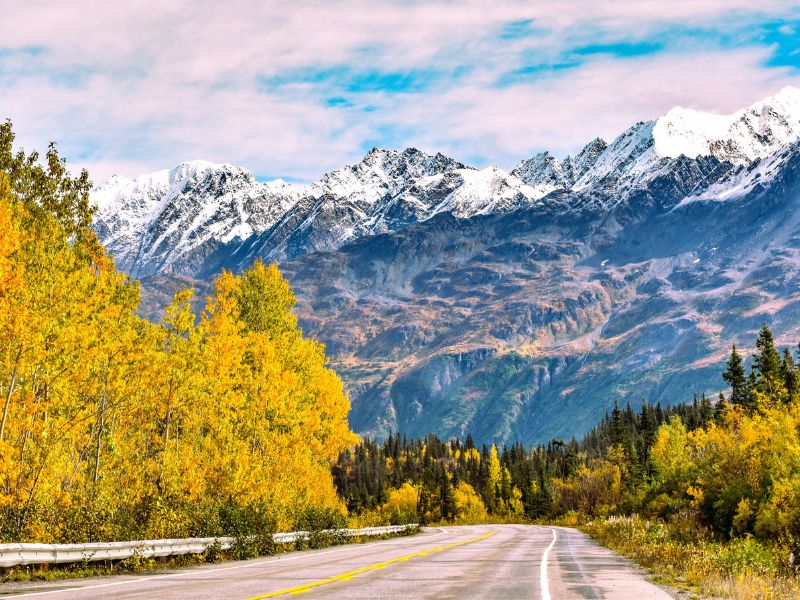
Hawaii
Foliage Characteristics
While Hawaii may not showcase the traditional fall foliage spectacle seen in colder climates, the uplands of Maui and the Big Island introduce a subtle yet captivating change in scenery. Cooler temperatures at higher elevations create an environment where lush greenery undergoes a gradual transformation, offering a tranquil escape for those seeking a unique autumnal experience. The islands, with their diverse microclimates, present an opportunity to witness the delicate interplay between nature and seasonal shifts. Exploring the higher elevation areas of Hawaii becomes a journey into a different facet of fall, where the vibrant tropical landscape subtly transitions, providing a serene and unexpected perspective amid the Pacific’s warm embrace.
Places to Explore
Visit the Upcountry of Maui for cool temperatures and scenic landscapes, or explore Hawaii Volcanoes National Park for a unique blend of volcanic terrain and subtropical foliage.
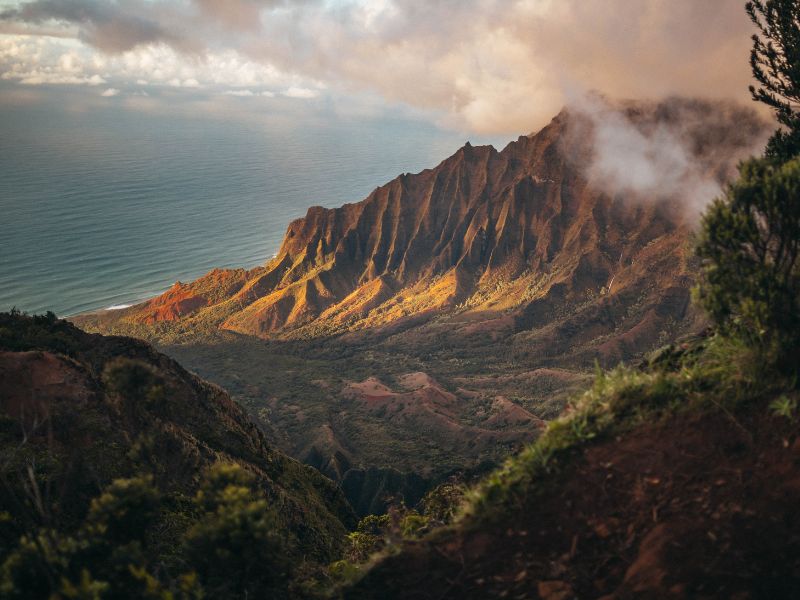
Conclusion
Exploring peak foliage across the Pacific is a journey into the diverse landscapes and unique climates that define this region. Each state offers fall experiences that are sure to defy expectations. From the rugged expanses of Alaskan tundra, where the landscape ignites with fiery hues, to the tranquil uplands of Hawaii, where subtle shifts in greenery accompany cooler temperatures, the Pacific region showcases a remarkable spectrum of autumnal beauty. The journey through these diverse states is not just an exploration of changing colors; it’s an immersion into some of the best and varied landscapes the United States has to offer.
Your trusted partner for fall cleanup.
Discover how this remarkable product can make yard maintenance a breeze.
SUBSCRIBE NOW
Looking for the most up-to-date fall foliage information, itineraries, and ideas? Sign up for our Newsletter here.

